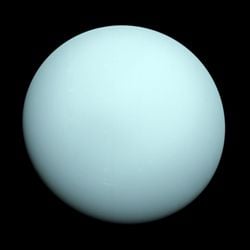Uranus: Difference between revisions
From Halopedia, the Halo wiki
mNo edit summary |
m (→Sources) |
||
| Line 24: | Line 24: | ||
An oddity among Sol's gas giants, Uranus is mostly unexplored and uninhabited by [[humanity]], as its distance from [[Sol]] makes traveling there costly. Its moons are poorly-understood when compared to those of [[Jupiter]]. Despite this, Uranus has a number of distinctive features that separate it from its neighbors. Firstly, its axial tilt has turned its poles past a 90<sup>o</sup> angle to the orbital plane. Secondly, Uranus has a number of anomalous radiation spikes that have not been addressed or explained. <ref name="Encyclopedia"/> | An oddity among Sol's gas giants, Uranus is mostly unexplored and uninhabited by [[humanity]], as its distance from [[Sol]] makes traveling there costly. Its moons are poorly-understood when compared to those of [[Jupiter]]. Despite this, Uranus has a number of distinctive features that separate it from its neighbors. Firstly, its axial tilt has turned its poles past a 90<sup>o</sup> angle to the orbital plane. Secondly, Uranus has a number of anomalous radiation spikes that have not been addressed or explained. <ref name="Encyclopedia"/> | ||
{{Clear}} | |||
== Sources == | == Sources == | ||
<references/> | <references/> | ||
Revision as of 06:29, January 22, 2019
| There is more information available on this subject at Uranus on the English Wikipedia. |
Uranus, named after the mythological Greek creator of the universe, is the seventh planet in the Sol system.[1]
An oddity among Sol's gas giants, Uranus is mostly unexplored and uninhabited by humanity, as its distance from Sol makes traveling there costly. Its moons are poorly-understood when compared to those of Jupiter. Despite this, Uranus has a number of distinctive features that separate it from its neighbors. Firstly, its axial tilt has turned its poles past a 90o angle to the orbital plane. Secondly, Uranus has a number of anomalous radiation spikes that have not been addressed or explained. [1]
Sources
- ^ a b Halo Encyclopedia: The Definitive Guide to the Halo Universe, page. 294-295, 2011 edition
